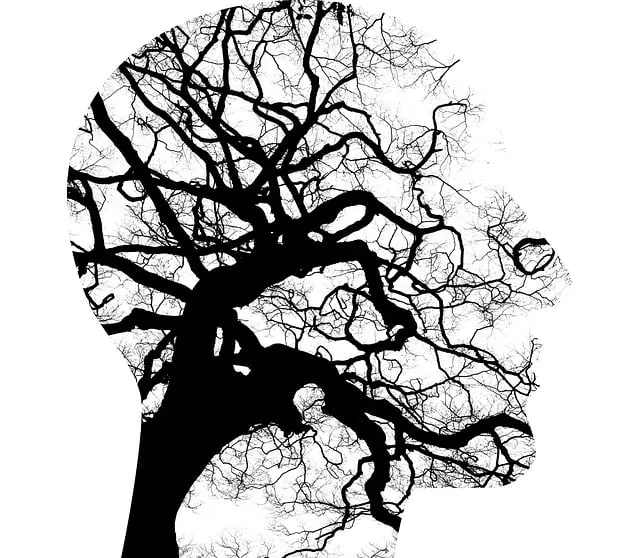Kaiser Permanente's comprehensive mental wellness coaching programs in Aurora integrate evidence-based practices like CBT, MBSR, and compassion cultivation to empower healthcare providers and foster inclusive environments. These programs, tailored to diverse communities, promote emotional well-being through crisis intervention, cultural competency training, and personalized journaling exercises. By combining research-backed methods with nuanced approaches, these initiatives enhance mental wellness outcomes, improve patient-provider relationships, and prioritize safety for sustainable positive change.
Mental wellness coaching programs are gaining prominence as essential tools for fostering holistic well-being. This article delves into the development of such programs, highlighting key components from understanding mental health fundamentals to integrating evidence-based practices. We explore successful models like Kaiser Permanente’s training programs and provide insights on customizing modules for diverse populations, including Aurora Community. Additionally, implementation strategies and success measurement are discussed, offering best practices for creating effective wellness coaching initiatives.
- Understanding Mental Health and Wellness: The Foundation of Coaching Programs
- Kaiser Permanente Training Programs: A Comprehensive Overview
- Integrating Evidence-Based Practices in Wellness Coaching
- Designing Customized Training Modules for Different Populations (e.g., Aurora Community)
- Implementation Strategies and Measuring Success: Best Practices for Effective Programs
Understanding Mental Health and Wellness: The Foundation of Coaching Programs

Understanding mental health and wellness is the bedrock upon which effective coaching programs are built. Mental wellness goes beyond the absence of illness; it encompasses an individual’s emotional, psychological, and social well-being. Coaching programs developed by organizations like Kaiser Permanente in Aurora, for instance, often incorporate evidence-based practices such as Stress Reduction Methods and Compassion Cultivation Practices to support holistic mental health improvement. These initiatives recognize that mental wellness is integral to overall health and quality of life.
By integrating insights from various fields, including psychology, neuroscience, and mindfulness studies, these training programs equip individuals with valuable tools for navigating life’s challenges. Additionally, the production of Mental Wellness Podcast Series can serve as a complementary resource, providing accessible information on topics like stress management, resilience building, and cultivating inner peace. Such multi-faceted approaches contribute to creating inclusive environments where people feel empowered to prioritize their mental wellness.
Kaiser Permanente Training Programs: A Comprehensive Overview

Kaiser Permanente training programs in Aurora have established a comprehensive approach to mental wellness coaching, focusing on both personal growth and professional development for healthcare providers. These programs aim to equip individuals with the necessary tools to navigate complex emotional challenges while fostering a supportive environment. The initiative includes various modules that educate participants on effective Crisis Intervention Guidance, ensuring they can offer immediate assistance during crises.
Moreover, the training emphasizes the importance of Healthcare Provider Cultural Competency Training, acknowledging the diverse nature of patients’ backgrounds and needs. By promoting cultural awareness, these programs foster empathy and improve patient-provider relationships. In addition to interactive workshops, participants receive Mental Wellness Journaling Exercise Guidance, encouraging self-reflection and the development of personalized strategies for managing stress and improving overall mental wellness.
Integrating Evidence-Based Practices in Wellness Coaching

Integrating evidence-based practices is a cornerstone of effective wellness coaching, especially in programs like those offered by Kaiser Permanente training in Aurora. These practices are backed by extensive research and have been proven to significantly enhance mental wellness outcomes. For instance, Cognitive Behavioral Therapy (CBT) techniques focus on identifying and changing negative thought patterns, thereby improving self-esteem and reducing stress. Such methods are integrated into coaching sessions to provide clients with practical tools for managing their mental health.
Moreover, wellness coaches in these programs often employ Mindfulness-Based Stress Reduction (MBSR) techniques, which encourage individuals to become more aware of the present moment without judgment. This promotes a sense of calm and resilience, helping individuals effectively navigate life’s challenges. By combining CBT and MBSR with other evidence-based practices, Kaiser Permanente’s training ensures that mental wellness coaching is not just therapeutic but also tailored to each individual’s unique needs, fostering positive change in a supportive environment.
Designing Customized Training Modules for Different Populations (e.g., Aurora Community)

In designing mental wellness coaching programs tailored to diverse communities, such as Aurora’s unique demographic makeup, a nuanced approach is essential. Customized training modules should consider the specific needs and challenges faced by individuals within the Aurora Community. For instance, Kaiser Permanente training programs in Aurora might incorporate cultural sensitivity training to address potential barriers and promote inclusive practices. By delving into topics like mental health policy analysis and advocacy, these modules can empower coaches to navigate complex systems and effectively support diverse populations.
Furthermore, integrating risk management planning for mental health professionals is vital. Training should equip coaches with strategies to identify and mitigate risks associated with working with different client groups. A comprehensive risk assessment for mental health professionals can ensure that Aurora’s coaching programs are not only effective but also safe, fostering an environment where individuals feel supported and empowered to prioritize their mental wellness.
Implementation Strategies and Measuring Success: Best Practices for Effective Programs

The successful implementation of mental wellness coaching programs requires a strategic approach and clear metrics for evaluation. Best practices involve integrating evidence-based Stress Reduction Methods, such as mindfulness and cognitive behavioral therapy, into the coaching curriculum. At-large organizations like Kaiser Permanente have pioneered training programs in Aurora that emphasize these techniques, demonstrating their effectiveness in enhancing overall well-being.
Measuring success goes beyond participant satisfaction. It should encompass quantifiable outcomes like improved Emotional Intelligence, enhanced social skills, and reduced symptoms of anxiety or depression. Regular assessments, both qualitative and quantitative, allow for continuous improvement. Peer mentoring, regular feedback sessions with coaches, and post-program follow-ups are key components that contribute to the success and longevity of these initiatives.
Mental wellness coaching programs, with a solid foundation in understanding mental health and evidence-based practices, can significantly enhance overall well-being. As seen in Kaiser Permanente’s comprehensive training programs, tailored approaches for diverse populations like the Aurora Community prove effective. By integrating best implementation strategies and measuring success, these programs not only improve individual mental wellness but also create a more supportive and healthy society. The development of customized training modules ensures accessibility and relevance, making mental health coaching a valuable resource in today’s world.






